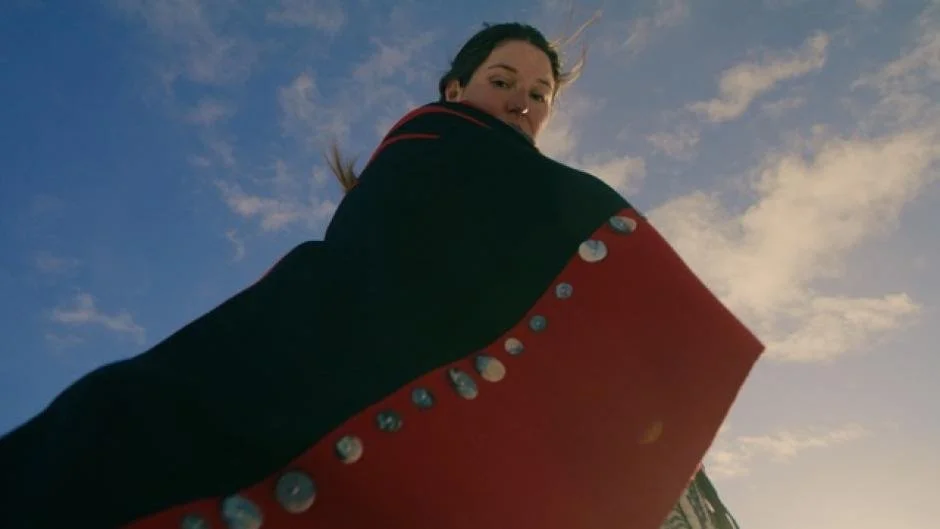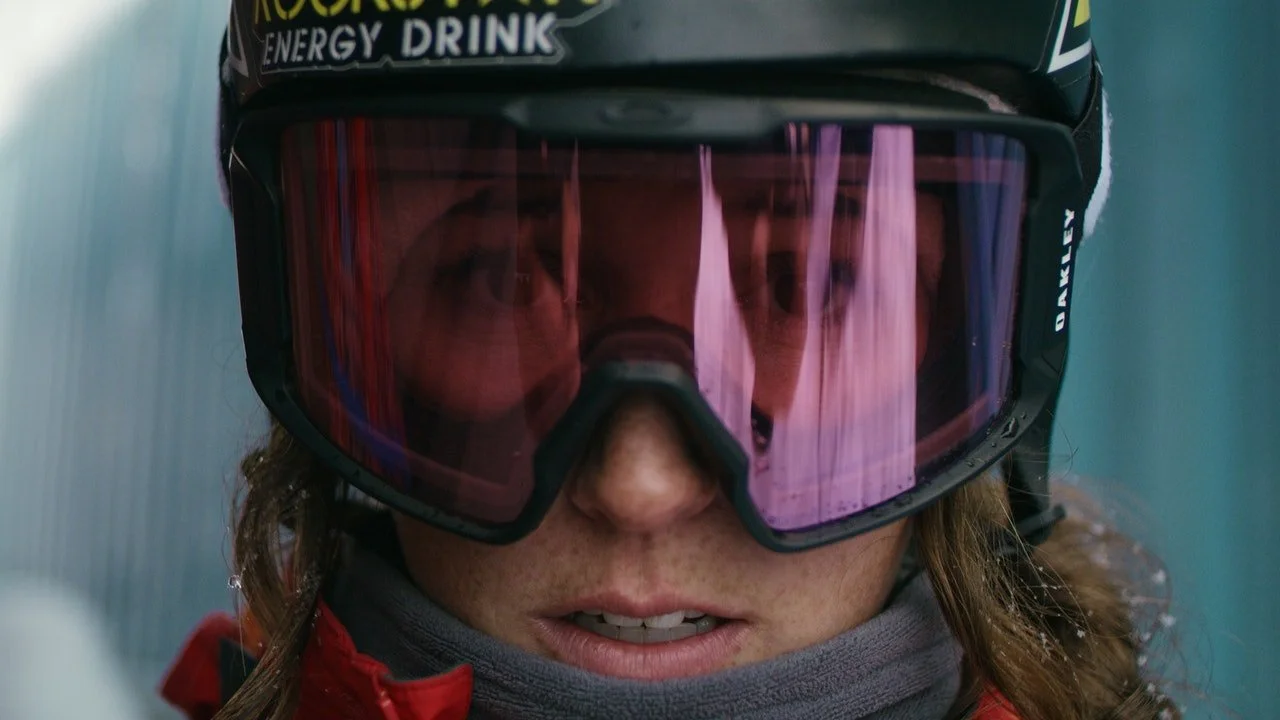Whistler Film Festival: Precious Leader Woman covers much more terrain than Spencer O'Brien's pro snowboarding career
The feature documentary by director Cassie De Colling explores the athlete’s Haida and Kwakwakw’wakw cultural awakening
Spencer O’Brien is the subject of Precious Leader Woman, screening at the 2021 Whistler Film Festival. Photo by Leo Hoorn
Whistler Film Festival presents Precious Leader Woman in person in Whistler on December 2 and 3. The film’s subject, Spencer O’Brien, and director, Cassie De Colling, will discuss the making of the film as part of the festival's industry-focused Content Summit at the Adventure Story panel on December 2. The festival itself runs as a hybrid event in person in Whistler from December 1 to 5 and online from December 1 to 31.
AUSTRALIAN-BORN, BC-BASED filmmaker Cassie De Colling was working as a drone pilot in the summer of 2018 on a project that landed her on traditional Kwakwaka'wakw territory, in Alert Bay. During her time there, she visited village’s U’mista Cultural Centre, which focuses on the Potlach Collection in its permanent collection and which features other stories and objects of the Kwakwaka'wakw people. The centre also has a hall of fame, and one of its members immediately caught De Colling’s eye.
Professional snowboarder Spencer O’Brien, who is part Haida and Kwakwaka'wakw on her mother’s side and who was born in Alert Bay, is a two-time world champion, six-time X Games medallist, and two-time Olympian for Team Canada. One of the globe’s most decorated and progressive slopestyle snowboarders, O’Brien was diagnosed with rheumatoid arthritis just two months before the 2014 Sochi Winter Olympics. Despite the debilitating pain of the genetic condition that she had experienced for over a year prior to her diagnosis, O’Brien pushed through, fighting her way to the podium at X Games Aspen and to the 2014 Olympics’ finals. O’Brien went on to represent Team Canada at her second Olympics in 2018 in PyeongChang. She competed in slopestyle and the Games’ debut of big air and was the only competitor to speak up about the athletes’ rights and safety in the face of howling, dangerous winds.
“She is just like a total boss,” De Colling says in a phone interview with Stir. “I had worked in Aspen and had seen her at X Games; I knew about her being a snowboarder and working in the snow industry; she was one of the few women in the sport. She was like a hero to me.
“I didn’t know she was from Alert Bay,” she adds. “I read the little blurb about her being from Alert Bay and going on to the Olympics and just thought that was such a cool story.”
De Colling shares O’Brien’s story in her latest feature documentary, Precious Leader Woman, which has its BC premiere as an official selection of the 2021 Whistler Film Festival. A Kiddo Original Films production in association with funder Telus Originals, the film was written by O’Brien and Kainai First Nation filmmaker Elle-Máijá Tailfeathers.
Spencer O’Brien. Photo by Tyler Ravelle
Precious Leader Woman carves into O’Brien’s snowboarding career trajectory, with stunning alpine scenery and epic footage of tricks like her backside 900, the athlete being the first woman to land the two-and-a-half rotations at the Aspen X-Games. However, the film covers much more terrain than O’Brien’s remarkable achievements in sport.
O’Brien openly shares as much about her journey as an athlete and her life with a chronic condition as her reconnection with her Indigenous roots in the 48-minute film. Like so many First Nations youth, she grew up knowing next to nothing about her Haida and Kwakwaka'wakw heritage because of the impacts of colonialism and residential schools. The more she begins to learn about her cultural identity, the more she embraces it. Over the course of filming Precious Leader Woman, a year-long process that took place during COVID, O’Brien reveals how her ancestry has become increasingly important to her as she has gotten older, her culture anchoring her and giving her a source of healing, purpose, and pride. The film takes its title from O’Brien’s ancestral name, which was bestowed upon her in 2018.
“Spencer is a phenomenally strong and authentic person,” De Colling says. “She is incredibly authentic and genuine, and the bravest and most admirable thing about her is she never would answer a question without being true to herself. She always stayed true to what was in her heart with every question and every thought.”
Spencer O’Brien. Photo by Leo Hoorn
De Colling, who finished film school 15 years ago and who focuses on female empowerment in her work, says her goal with the film is not only to share O’Brien’s remarkable story but also to raise awareness of Truth and Reconciliation Canada Commission’s Calls to Action and of various organizations people can support, such as Indigenous Life Sport Academy (which O’Brien is involved in), Indian Residential School Survivors Society, and Raven Trust.
O’Brien, who has since transitioned out of competing to focus on backcountry sport, had a say in the editing room, and De Colling ensured that there was more than 50 percent indigenous representation on the crew. O’Brien’s sister, Avis, who is interviewed in the film, acted as the project’s cultural consultant, for example; the score was composed by Matthew Cardinal, who’s based in amiskwaciy (Edmonton) and is best known for his work with the band nêhiyawak. Indigenous co-producer Hayley Morin (working alongside Mack Stannard) also produced the award-winning skateboarding film Joe Buffalo. The film was edited by Dakota Morton, a member of the Métis First Nation Association.
“I was really adamant about the film having a bigger crossover purpose,” De Colling says. “We’re going to be sending it out to schools and universities later down the track, hoping to start a conversation and hoping provide more support to the Indigenous Life Sport Academy and other partner organizations.
“As a storyteller and a documentary filmmaker, this project is not about me,” she says. “I can use my skills to create purpose as a story teller, to make change and start conversations. One thing I do really believe in is making films with people, not about people….We had Spencer as a writer, and she had full autonomy on the snowboarding edits but also making sure she was comfortable with what she was saying. It’s really important as a non-Indigenous director to hold space for Indigenous voices, to be a facilitator and also not to take up space.”
For more information, see Whistler Film Festival.
















